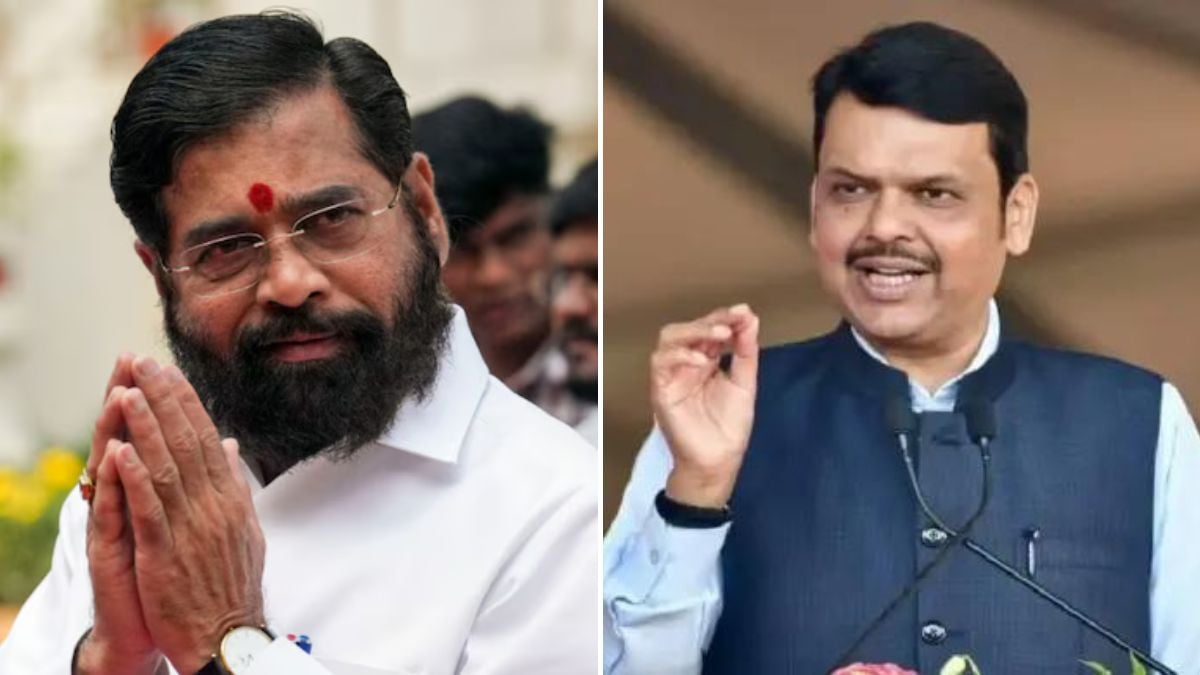Mumbai: In a move that could change the power dynamics, caretaker Chief Minister Eknath Shinde held a press conference at his Thane residence on Wednesday, where he displayed an air of reluctant acceptance, which is being interpreted as him having bowed out of the race for the CM’s post; this, in turn, was seen as setting the stage for a dramatic return of Devendra Fadnavis.
Acknowledging the compulsions of coalition politics and the ground reality, Shinde revealed that he had spoken to Prime Minister Narendra Modi who advised him on the way forward. Political observers said this was not just a retreat; it was a tactical exit, with Shinde’s eyes glued to the horizon.
Shinde gave a glimpse of his vision when he made a self prophecy, “Jeevan mein asli udaan abhi baaqi hai, hamare eeradon ka imtihaan abhi baqi hain, abhi toh naapi hai sirf mutthi bhar jameen, abhi toh sara aasman baaqi hai.” (“The real flight in life is yet to come, the test of our ambitions is still in abeyance, so far we have only measured a handful of land, the entire sky is still left to be charted”).
The philosophical lament was a signal that his political journey wasn’t ending but simply pivoting. It underscored Shinde’s latent political ambitions and hinted that there was more to come— something perhaps more daring and far-reaching than a brief stint as the CM of Maharashtra. But was he speaking of his own aspirations, or was he alluding to a strategic game plan where the BJP’s calculations are concerned? With Mumbai’s municipal elections on the horizon, could Shinde’s words hint at power play in the city that never sleeps?
The Golden Goose Of Mumbai Politics
The BMC is the golden goose of Mumbai politics, a source of power and treasure that, in the hands of the right party, keeps the coffers full. When Shinde finished, there was a palpable shift in the room, not just at the Thane press conference but in the corridors of power throughout the state. Was this a tacit acknowledgment that the BJP had laid down the law, and Shinde, despite his tough talk, had little choice but to acquiesce? Political circles were abuzz with speculation that a deal had already been struck in Delhi.
A potential post for Shinde’s son or a close ally in the Union Cabinet was mentioned in hushed tones, even as whispers suggested a deputy chief ministership with a plum portfolio might be on offer to assuage any bruised egos. The BJP, while accepting Shinde’s decision, remained characteristically tight-lipped.
Maharashtra BJP President Chandrashekhar Bawankule On Eknath Shinde’s Statement
State BJP president Chandrashekhar Bawankule, in a rare show of visible relief, greeted Shinde’s statement with an acknowledgment of the CM’s magn.mity. “It was very generous of Shinde to make it clear he would accept whatever decision was made in Delhi,” Bawankule remarked, reflecting an unspoken belief that Fadnavis’s return was all but assured.
While Shinde’s retreat could be read as a strategic step to preserve his political capital, it wasn’t a complete surrender. His decision to reference a private phone call with the PM served two purposes: it framed his exit as a thoughtful one, endorsed by the top brass of the ruling party, and shielded him from being branded a pawn in the BJP’s game of chess. The carefully chosen delay in convening the press conference—a full 45 minutes past the appointed time—was reportedly due to Shinde wanting to ensure every “i” was dotted and every “t” crossed before appearing before the media, mindful of the Shiv Sena UBT’s tendency to pounce on perceived weaknesses. Yet, Shinde’s declaration also seemed to signal a level of tactical defiance, a note of defiance, perhaps, tied to the upcoming BMC elections.
As the BJP gears up to pick its new CM, there’s no doubt that Shinde’s camp will keep a keen eye on the ballot box. The BMC, after all, isn’t just a municipal body—it’s the very lifeblood of Mumbai’s political power. “If Shinde is to be seen as a true power player, delivering the BMC to the Mahayuti coalition could make all the difference,” whispered a senior political strategist from the state.
For now, the real center of gravity for Maharashtra politics has shifted to New Delhi. The key players—Shinde, Fadnavis, and Ajit Pawar, the leader of the NCP faction that has added its weight to the coalition—will meet with the BJP’s top brass, including Amit Shah, to hammer out the final details of the new government. The outcome of this meeting will decide everything from deputy chief ministerships to key portfolios and the division of power among the three parties.
Shinde, with his cryptic words and air of dignified resignation, could yet surprise the political world after the BMC elections. And while Fadnavis, eager to reclaim the seat, may well find himself at the helm, Shinde’s statement suggests there is still a flight left to soar, an untold chapter waiting to be written. The question on everyone’s lips: How will the political sky look once the dust settles? Will Shinde’s departure prove to be a mere prelude to a new act, or will the BJP seal the narrative with a clean and unambiguous chapter titled The Return of Fadnavis? For now, Maharashtra holds its breath, waiting for the next move.

